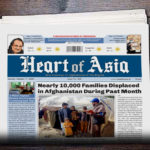Former Chief Executive Officer of the Unity Government of the Islamic Republic of Afghanistan, and now leader of the High Council for National Reconciliation, Abdullah Abdullah, was in Pakistan in the last week of September seeking the latter’s help in getting the Taliban to stop killing and sit down with the government in Kabul and talk about the future of the country. Persian-speaking Abdullah was immediately likeable, quoting Pakistan’s national poet Allama Iqbal in Persian and speaking Urdu with TV hosts. In terms of public relations, he was an immediate success in contrast to President Ashraf Ghani, whose earlier visit was marked with stiffness because of his scepticism about Islamabad’s “friendship” with his government.
Both visits were a parable of paradox. Ghani was a Pakhtun deeply suspicious of Pakistan, Abdullah, a Tajik, seemed upbeat. The Pakhtun represent the external image of Afghanistan but they are deeply divided. Tajik Abdullah is supposed to be pro-India but appears to have forgotten what Pakistan did after all the commanders facing up to the Soviet invasion of 1979 took refuge in Pakistan. Clearly, the “charismatic” Pakhtun Hekmatyar was preferred over the Tajik leader Ahmad Shah Massoud. For Pakistan, the choice was natural: Afghanistan was an extension of its own Pakhtun Belt on the Durand Line, and the Tajiks were peripheral to its strategic interest. Today, Pakistan is disenchanted with the old policy of Talibanisation of Pakistan.
India has traditionally been connected with the Tajiks of northern Afghanistan and developed political-social relations with them — like Tajiks getting their higher education in India — while Pakistan got into trouble with its side of the Afghan jihad. The last leader of the Taliban — Mullah Fazlullah —played havoc with the Swat Valley in Pakistan’s north until he was ousted from there. While in Afghanistan, he delivered the most lethal blow to Pakistan — the 2014 massacre of children at an army-run school in Peshawar, killing 132 children. (Ehsanullah Ehsan, the man who planned the massacre, was caught by Pakistan but was able to mysteriously escape; yet another indicator of Pakistan’s vulnerability while dealing with Afghanistan.) Somehow, one believes that the Pakistani Taliban sheltering in Afghanistan will remain separated from the Afghan Pakhtuns in the post-US phase.
But it is the Haqqani Network Pakistan is delivering on in the latest phase of diplomacy. The Haqqanis, married into the Gulf Arab aristocracy, are the strongest group of fighters in Afghanistan. A joint cell of the Islamic State or Daesh and the Haqqani network recently carried out major attacks in Kabul, including an attack on a Sikh temple in March. Pakistan is supposed to get the Haqqanis to agree that the Taliban and other jihadi outfits like Islamic Jihad would stop killing and sit across the table with the Afghan government. In 2012, the US had tried to persuade Pakistan about joint action against the Haqqanis and Mullah Fazlullah but Pakistan wouldn’t see the two as one force. Once again, it is Pakistan’s outreach to the Haqqani Network that is being considered an important factor in discussing the future of Afghanistan.
Pakistan is supposed to be facing off a possible Indian penetration into Afghanistan but its real danger is from the jihadi outfits — the Pakistani Taliban and Afghan Taliban, Islamic State, al Qaeda, etc — with warriors from the northern neighbourhood like Uzbeks and Uighurs. If the Taliban take over from the Afghan government, they will have a tough time deciding which group of warriors will have the lead in governance. They will likely end up dividing the country into infighting satrapies. The sharia will have to come back to regain consensus, and much of the social development under the Afghan government and American guidance will be rolled back. And there will be civil war redux, and consequently a lot of refugees — women and children — racing across the borders.
Aware of the coming chaos, Pakistan is wire-fencing its border with Afghanistan and there are people on the other side who don’t want it and Pakistan army personnel are being killed daily on the Durand Line. Who could be behind this? The Pakistani Taliban, who can easily be bribed by anyone, are thought to be behind it. Pakistan, disenchanted finally with its “strategic depth” dream, is nonetheless fatally unafraid of “the dream of sharia”. The Haqqani Network can help because it is the strongest group fighting under one command but its ideological worldview is different from the average Pakistani, barring the rare general like Shahid Aziz who will disappear after retirement and join the Islamic State in Syria and achieve the kind of martyrdom Pakistan couldn’t allow — fighting to the last against the evil of the US.
Pakistan is vulnerable to the coming ideological storm in Afghanistan. Its border provinces are rebellious and receptive to the new wave of strict Islam, helped no less by the deeply aggrieved and “believing” populations that it allowed to be crushed by its jihadis.













